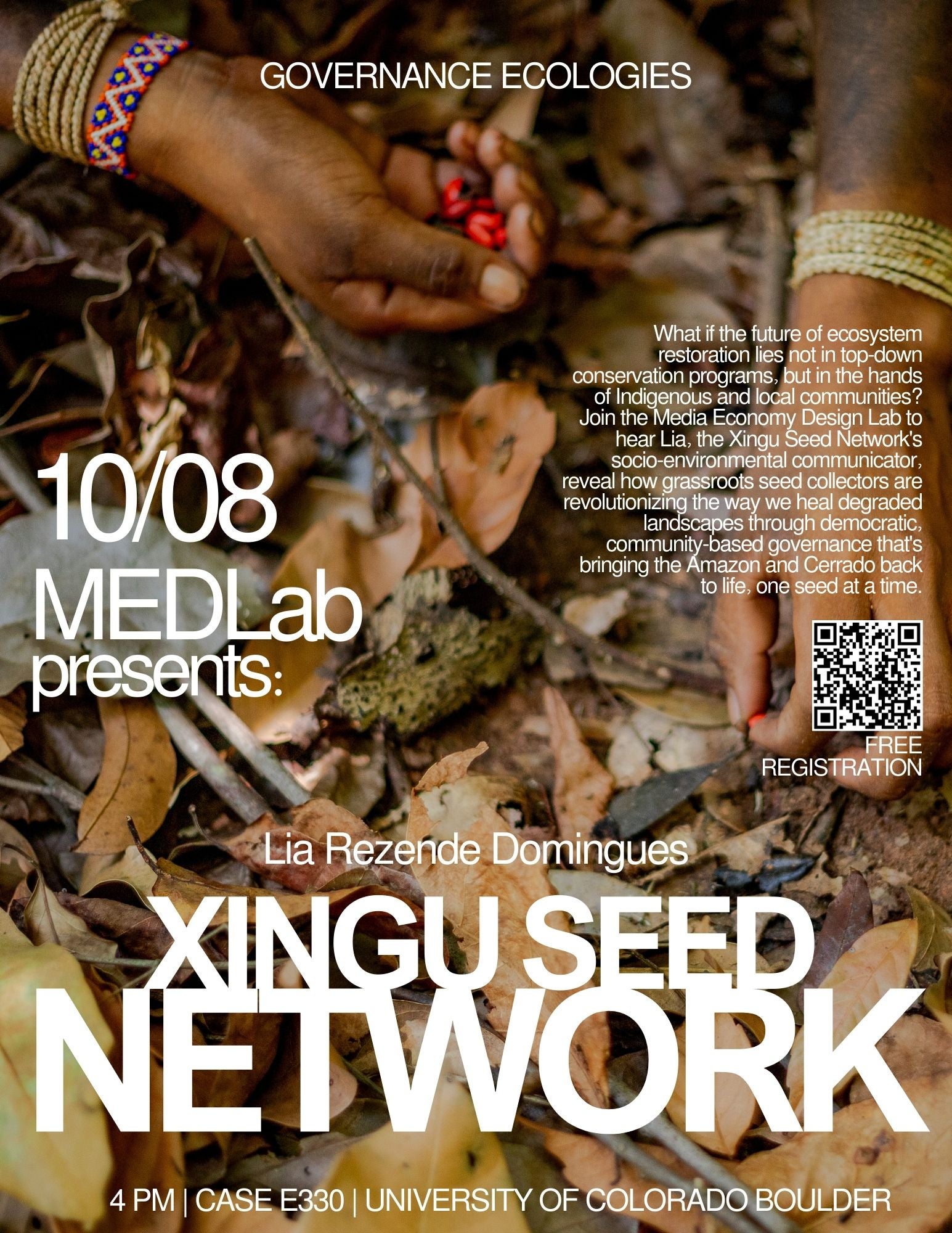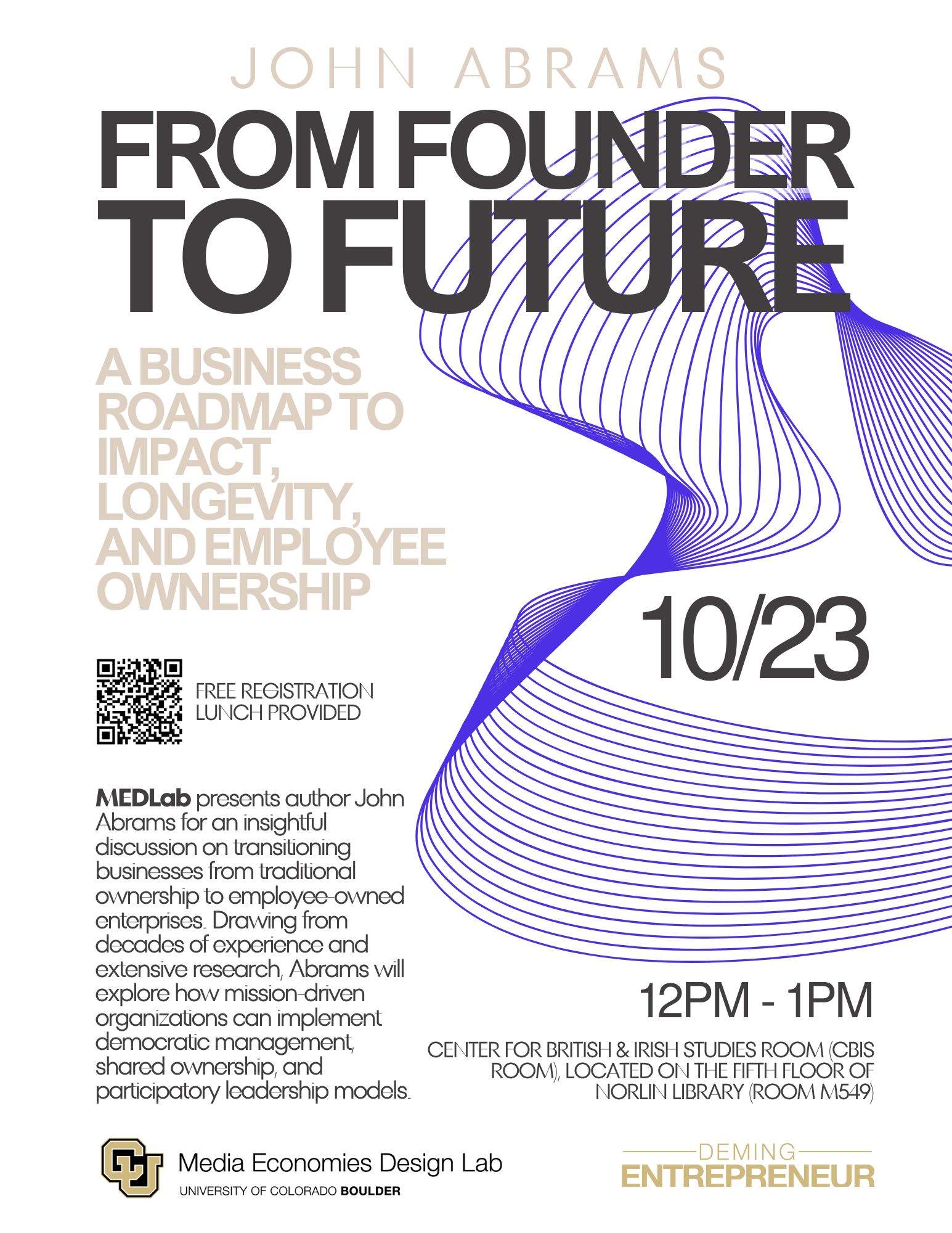 Seeds of democracy: Learning from the Xingu Network
Seeds of democracy: Learning from the Xingu Network
October 8, 2025
4 p.m. Mountain Time
CASE E330
What if the most effective conservation isn't happening in boardrooms or government offices, but in the hands of Indigenous women collecting seeds along Brazilian riverbanks?
Join us October 8th at 4 PM in CASE E330 as the Media Economies Design Lab welcomes Lia Rezende Domingues from the Xingu Seed Network—a remarkable organization that's proving democracy and environmental restoration go hand in hand.
The Xingu Seed Network isn't your typical environmental organization. Born from the grassroots in 2007, this Brazilian collective has grown into a 700-member network where Indigenous peoples, family farmers, and urban communities work together to heal degraded Amazon and Cerrado landscapes. Their secret? Participatory governance that puts decision-making power directly in the hands of those doing the work.
 John Abrams: From Founder to Future
John Abrams: From Founder to Future
October 23, 2025
12 p.m. - 1:30 p.m. Mountain Time
British & Irish Studies Room
Norlin Library room M549
MEDLab presents author John Abrams for an insightful discussion on transitioning businesses to employee ownership. Drawing from decades of experience and extensive research, Abrams will discuss how mission-driven organizations can implement democratic management, shared ownership, and participatory leadership models.
Please register for this free event here. Lunch provided.
New paper: "Online Governance Surfaces and Attention Economies"
New paper now available from MEDLab director Nathan Schneider and colleagues:
This paper considers the intersection of governance and attention in digital contexts. In particular, it argues for the relevance of ‘attention economies’, or the analysis of human attention as a resource, to ‘governance surfaces’, or the means available for organisational adaptation and action. Existing theoretical frameworks for the governance of community-managed resources lack adequate consideration for how people’s attention is engaged and directed. To address this gap, this paper proposes heuristics that assess how attention relates to governance in online organisations. The heuristics are informed by literature on attention economies and governance, as well as three case studies that consider recent attempts to address attention in the design of governance surfaces in blockchain-based systems. The resulting heuristics serve as analytical and normative tools to enable researchers and system designers to better understand attention in a governance system. They invite consideration of whether the structure of attention in a system is appropriate, efficient, and just.
Read the open-access paper at MediaArXiV.
Call for papers: "The Imaginative Landscape of AI"
Few technological developments spark more debate today than artificial intelligence. From promises of human advancement to fears of existential risk, AI generates a multitude of visions, conflicts, and societal debates. The International Journal of Communication is launching a Special Section on The Imaginative Landscape of AI: Visions, Positions, Conflicts. The editors of this Special Section, Andreas Hepp and Nathan Schneider, invite submissions that empirically explore emerging imaginaries, ideological positions, and conflicts surrounding AI.
Key deadlines:
- Abstracts (500 words) due December 1, 2025
- Notification of acceptance by January 1, 2026
- Full manuscripts due May 1, 2026
- Publication in spring 2027
More information and the submission form can be found here.
Podcast: How are video games rewriting narratives?
 MEDLab's radio show, Looks Like New, comes out the fourth Thursday of every month on KGNU, 88.5 FM, or online as a podcast. Last month's episode is now available:
MEDLab's radio show, Looks Like New, comes out the fourth Thursday of every month on KGNU, 88.5 FM, or online as a podcast. Last month's episode is now available:
Júlia Martins Rodrigues speaks with Warren Liu, a Media Studies doctoral student. Liu examines how video games shape culture—both by reflecting colonial legacies and by offering space to challenge them.
Their conversation explores how games can spark decolonial thinking and open new paths for cultural exchange. From reclaiming narratives and traditions to reimagining design and player agency, they discuss how gaming can become a tool for inclusivity, empathy, and social change.
Subscribe today on Apple Podcasts, Spotify, or directly through our website. You can also follow the show on Instagram, Mastodon, and X.

 Seeds of democracy: Learning from the Xingu Network
Seeds of democracy: Learning from the Xingu Network John Abrams: From Founder to Future
John Abrams: From Founder to Future MEDLab's radio show, Looks Like New, comes out the fourth Thursday of every month on KGNU, 88.5 FM, or
MEDLab's radio show, Looks Like New, comes out the fourth Thursday of every month on KGNU, 88.5 FM, or 